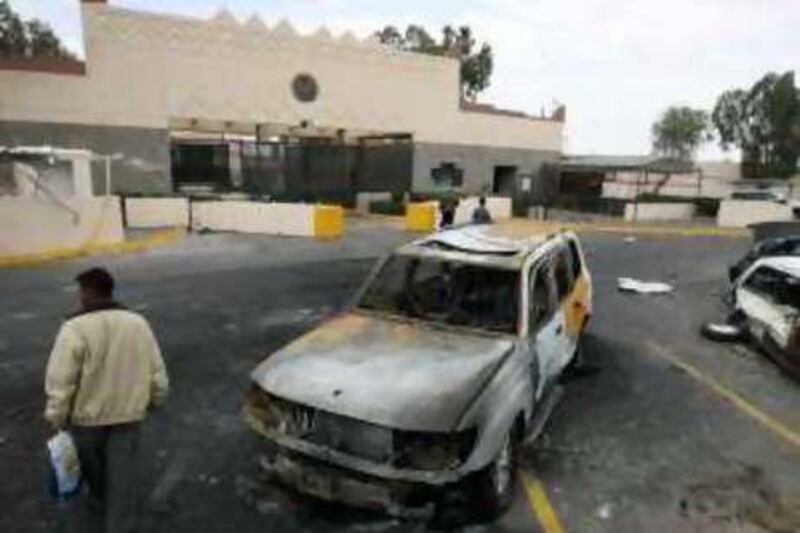SANA'A // Yemen has appealed for help from the international community in fighting terrorism following a suicide car bombing at the US Embassy last week that killed 17 people, including a US citizen and her Yemeni husband. "Yemen cannot crack down on terrorism without the international community's support. The deadly attack on the US Embassy has demonstrated the need for more support so that we can confront terrorism," said Abu Bakr al Qirbi, Yemen's foreign minister.
The attack on the US mission in Sana'a last Wednesday was claimed by an al Qa'eda-linked group called Islamic Jihad in Yemen. It threatened more attacks on British and Saudi targets unless Yemen freed several of its jailed members. Mr Qirbi said Yemen could not battle the militants without more help from the United States. Washington currently gives Yemen about US$45 million (Dh165.1m) a year. "Yemen was asked to do more than it could. The US, of course, helped us but this is far from what Yemen needs," he said.
He said the United States supported Yemen by training its security forces, but much remains to be done in areas of poverty, unemployment and education - widely regarded as key battlegrounds in fighting terrorism. "We have to revise our approach to fighting terrorism by talking about issues like poverty, unemployment and others. Unless we approach terrorism in this manner, I think our efforts will not see much success," Mr Qirbi said.
Yemen is one of the poorest countries in the world. With a population of 22 million, 42 per cent live on less than $2 per day, and unemployment runs at 35 per cent, according to World Bank statistics. Mr Qirbi said terrorism was damaging Yemen's reputation and slowing progress. "Terrorism activities have made it difficult to attract investments in and have slowed down development projects. They have also hit the tourism sector as some European countries, influenced by exaggerated media reports, issue travel warnings not to travel to Yemen and this serves the interests of the terrorists," he said.
Mr Qirbi said he believed the attack on the US mission was in retaliation for a government operation last month in the southeastern province of Hadhramaut in which five suspected al Qa'eda members were killed, including the Yemeni group's No 2 leader, Hamza al Quaiti. "After the recent crackdown on al Qa'eda militants, there were threats they would take revenge. I think the more they feel pressure from Yemen and the international community, the more they try to demonstrate they are still there," he said.
Quaiti had been blamed for masterminding several militant attacks in Yemen in recent months, including four car bomb attacks and an attack on Belgian tourists in Hadhramaut on Jan 18 that killed two Belgian women and two Yemeni drivers. The ministry has also accused Quaiti of being behind a US Embassy bombing in March. Ali Abdullah Saleh, Yemen's president, condemned Wednesday's attack and vowed to find those responsible.
"I promise that we will hunt down them wherever they may be? and bring them to justice," Mr Saleh said in a speech in the Red Sea port city of Hodeidah. "These terrorist actions are against everyone, not against the political system only, they are against development, stability and the Islamic religion," he said, according to state media. The president urged Yemenis, including educators, the clergy and intellectuals, to reject extremism and spread the "noble values" of Islam.
"Security forces cannot prevent a terrorist from dying because he has decided to die, and this is a result of an ignorant and backward mindset. They offer no plans to serve the country; their plans are just death and destruction," he said. Mr Qirbi said authorities were still investigating the attacks. Officials earlier said about 30 people had been arrested. "Investigations are going on and the arrested people will be interrogated. Some of the arrestees might be innocent, of course. One cannot, however, ignore information received by the security," he said.
Security has been stepped up at embassies and other diplomatic offices in Sana'a. However, the British Embassy said Friday it was closing its mission. Ryan Gliha, a US Embassy spokesman, said a team of FBI investigators had been sent to help local police and inspectors from the embassy in the investigation. He said the embassy would be closed for routine consulate services but would be open for emergency services to US citizens.
Yesterday, Yemeni security forces blocked traffic around the embassy and were stopping and searching people travelling in the neighbourhood. Some residents in the area said they were afraid about the potential for future attacks. "The explosion was scary. My father and other families have started to think about moving after the attack," said Mohammed Jamal, whose house is a few hundred metres from the US Embassy.
malqadhi@thenational.ae





